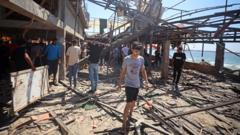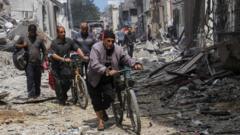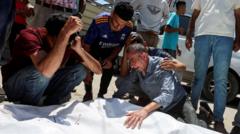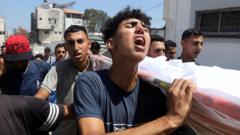As Sudan’s civil war ravages Darfur, 19-year-old Alawia Babiker Ahmed shares her harrowing experience of losing a child while fleeing airstrikes, rescuing an orphan, and enduring violence from armed groups. This story highlights the humanitarian crisis affecting millions as families confront the cruelty of war and the struggle for survival.
Survival and Resilience Amid Sudan’s Civil War

Survival and Resilience Amid Sudan’s Civil War
A heartbreaking account of Alawia Babiker Ahmed and her family, who flee violence in Sudan, facing unimaginable challenges on their journey to safety.
In the midst of the ongoing civil war in Sudan, stories of despair and courage emerge daily. One such story is that of Alawia Babiker Ahmed, a 19-year-old woman who experienced unimaginable loss while fleeing the war-torn region of Darfur. During her arduous three-day journey of approximately 70 kilometers (45 miles) from the besieged city of el-Fasher to the small town of Tawila, Alawia suffered a miscarriage as she sought safety from relentless air strikes and armed groups. Despite her trauma, she remained resolute, stating that she encountered others in even more desperate situations.
During her harrowing escape, Alawia and her family came upon an abandoned infant, crying near his deceased mother by the roadside. Without hesitation, Alawia took the child into her care, stating, “We covered the mother and kept going.” The ongoing conflict has led to a dire humanitarian crisis, with over 12 million individuals displaced from their homes since fighting erupted in April 2023, primarily fueled by tensions between the army and the Rapid Support Forces (RSF).
As the violence escalated in Darfur, the RSF, which has gained significant control in the area, intensified its attacks on el-Fasher. This critical city remains under army control but faces relentless bombardment. Alawia’s brother, Marwan Mohamed Adam, 21, also experienced the perils of their journey, suffering assault and robbery at the hands of RSF-affiliated gangs. He narrowly avoided execution by deceiving attackers about his origins.
Marwan recounted the fear that gripped him as he walked through the chaos, where he came across bodies and witnessed the aftermath of violence. Another refugee, Khadija Ismail Ali, shared the heartbreaking loss of 11 family members, including children who succumbed to thirst during their escape from el-Fasher to Tawila.
The humanitarian crisis in this region is exacerbated by food shortages as armed groups steal resources from fleeing families. Alawia described the desperation her family faced, including losing their meager supplies in the chaos of fleeing airstrikes. On their perilous journey in search of water, they encountered RSF fighters who robbed them once again, refusing their pleas for help.
After enduring physical assaults and emotional turmoil, Alawia and her family finally reached Tawila, where Alawia collapsed from exhaustion and was treated for her injuries. The family has now found shelter with local residents and is attempting to rebuild their lives amidst the uncertain backdrop of ongoing conflict.
While Alawia expresses gratitude for their current safety, she acknowledges the lingering worries about the future, as millions of other Sudanese have fled their homeland in search of refuge. Her brother Marwan aspires to study abroad, a dream shared by countless people whose lives have been shattered by this relentless war.
As the conflict rages on with no end in sight, stories of resilience like Alawia's serve as a poignant reminder of the human spirit's struggle against the backdrop of war and suffering.






















